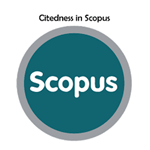UJI AKTIVITAS ANTIBAKTERI EKSTRAK METANOL DAUN KECUBUNG (Datura metel L.) TERHADAP BAKTERI Streptococcus pneumonia DAN Klabsiella pneumonia
Abstract
Infectious disease is a disease caused by microbes, including bacteria. One of the microorganisms that often causes infectious disease is Streptococcus pneumoniae and Klabsiella pneumoniae. Based on empirical data, plant that has antimicrobial potential is amethyst leaves (Datura metel L.). This study aims to know the antibacterial activity and concertration of amethyst leaves (Datura metel L.) against Streptococcus pneumoniae and Klabsiella pneumonia. This is an experimental study which includes antibacterial activity test, MIC (Minimum Inhibitor Concertration) test, MFC (Minimum Fungicidal Concertration) test, and bacterial potency test. The finding shows that the antibacterial activity test of amethyst leaves (Datura metel L.) methanol extract is able to inhibit bacterial growth of Streptococcus pneumonia at a minimum inhibitor concertration of 15% and an optimum concertration of 50% with an average of 16.33 mm and 19.30 mm. Meanwhile, for Klabsiella pneumoniae, the minimum inhibitor concertration is 20% and the optimum concertration is 50%, with an average of 13.82 mm and 17.73 mm. this is based on the results of One Way Anova data (a <0.01) with a 99% confidance level.
Keywords
Full Text:
PDFReferences
Astuti (2009). Sifat Organoleptik Tempe Kedelai yang dibungkus plastic, Daun Pisang, Daun Jati. Karya tulis Ilmiah diterbitkan Universitas Muhammadiyah Surakarta : Surakarta
Aziz. 2010. Metode Penelitian Kesehatan Paradigma Kuantitatif. Health Books Publishing: Surabaya
Cappuccino, James G. 2009. Manual Laboratorium Mikrobiologi. EGC: Jakarta
Darmadi. 2008. Infeksi Nosokomial Problematika dan Pengendaliannya. Jakarta.
Ditjen POM. (2000). Parameter Standar Umum Ekstrak Tumbuhan Obat. Cetakan Pertama. Jakarta: Departemen Kesehatan RI. Halaman 3-5, 10-11.
Harborne, H. 1987. Metode Fitokimia. ITB: Bandung
Herwin dkk. 2018. Aktivitas Antibakteri Ekstrak Etanol Daun Ampas The Hijau (Camellia sinensis L.) terhadap Bakteri Penyebab Jerawat (Propionibacterium acne dan Staphylococcus epidermidis ) Secara Difusi Agar. Makasar: UMI
Holetz, F.B., G. L. Pessini, N.R. Sanchez, D. Aparicio, G. Cortez, C.V. Nakamura, & B.P.D. Filho. 2002.Screening of Some Plants Used in The Brazillian Folk Medicine for The Treatment of Infectious I.Journal of Bioline.
Jawetz et al., 2001. Mikrobiologi Kedokteran Edisi XXII. Jakarta: Penerbit Salemba Madika
Lamapha, Yulia F. Dan Rupilu Novie S.2008. potensi Lengkuas sebagai Antimikroba (Studi In Vitro pada Bakteri Gram Negatif).
Mould, FL dkk. 2005. In Vitro Microbial Inculum: A Review of its function and properties. Anim Feed Sci Technol. Part 1:31-50. Doi: 10.1016/j.anifeedsci
Mukhriani, 2011. Ekstraksi Pemisahan Senyawa dan Identifikasi Senyawa Aktif, Jurnal Kesehatan
Robinson, T., 1995, Kandungan Organik Tumbuhan Tinggi, Edisi IV. Hal 191-216, Diterjemahkan Oleh Kosasih Padmawinata, ITB., Bandung
Shandar, H.K., B. Kumar, S. Prasher, P. Tiwari, M. Salhan, & P. Sharma. 2011. A Review Of Phytochemistry And Pharmacology Of Flavonoids. Internationale Pharmaceutica Sciencia, Vol. 1
WHO. Pneumonia : The forgetten killer of children. 2006. Geneva : the United Nations Children's Fund/world Health Organization.
DOI: https://doi.org/10.37311/ijpe.v1i3.11776
Refbacks
- There are currently no refbacks.
Copyright (c) 2021 A. Mu'thi Andy Suryadi, Moh Adam Mustapa, Faramita Hiola, Sintiya Basiru

Indonesian Journal of Pharmaceutical Education is licensed under a Creative Commons Attribution-NonCommercial-ShareAlike 4.0 International License.



